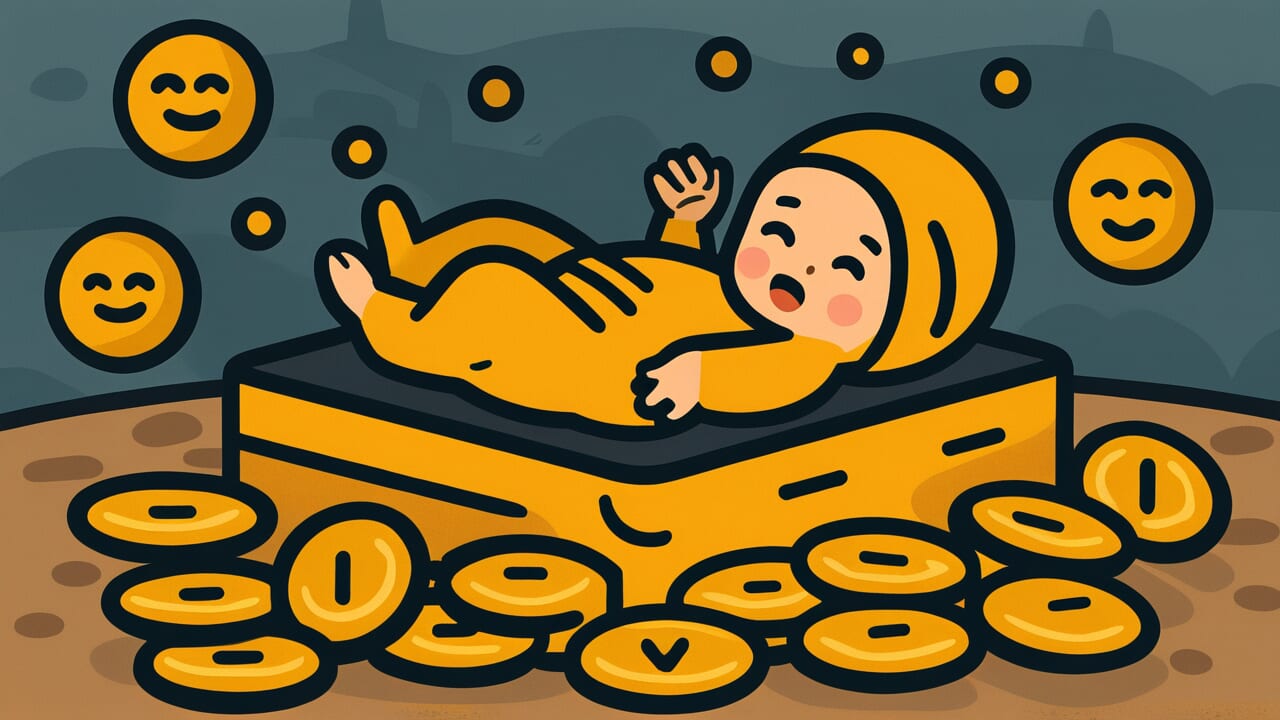How to Read “Money gives birth to children”
Kane ga ko wo umu
Meaning of “Money gives birth to children”
“Money gives birth to children” means that when you invest money, it can generate profit. It expresses how you can earn returns beyond your original amount by not just holding money, but by investing it in business or commerce, or lending it out to earn interest.
This proverb is used when discussing the importance of managing and investing money. For example, it appears in contexts about how you can grow your assets by using money wisely instead of just letting it sit in savings.
It’s also used when talking about the importance of startup capital for business or the advantages of having capital.
Today, there are many ways to grow money, including stock investments, real estate investments, and business funding. This proverb still lives on as a phrase that clearly expresses the basic concept of asset management.
However, we shouldn’t forget that investment carries risks and requires wise judgment.
Origin and Etymology
The exact origin of “Money gives birth to children” isn’t clearly documented. However, its background likely lies in the development of commerce in Japan and the spread of financial concepts.
During the Edo period, the merchant class rose to prominence. The financial industry developed, with people lending money and earning interest.
In the previous agriculture-centered society, land was the source of wealth. But as the monetary economy developed, people widely recognized that money itself could generate new wealth.
What makes this expression interesting is how it applies the life activity of “giving birth” to the inanimate object of money. Just as animals and plants produce offspring, money also produces “children”—meaning profit or interest.
This metaphor has the power to help people intuitively understand how capital multiplies.
Unlike the contrasting proverb “Money circulates through the world,” this one emphasizes the importance of active investment and management. It tells the story of how the idea of making money work, not just spending it, spread among common people as commerce developed.
Usage Examples
- It’s a waste to just put your retirement money in a fixed deposit. Let’s think about managing it so money gives birth to children.
- He started a business with little capital and succeeded. He truly practiced money gives birth to children.
Universal Wisdom
Behind the passing down of “Money gives birth to children” lies deep insight into the nature of wealth in human society. Why has this phrase survived across time?
It’s because it strikes at the core of economic activity that’s unavoidable in human life.
Everyone seeks a better life. However, if you only work to earn money and spend it, you remain forever bound to labor. This proverb shows a shift in thinking—letting money itself work for you.
This isn’t just about making money. It suggests a path to liberation from time, our limited resource.
What’s interesting is that this proverb uses the life metaphor of “giving birth to children.” It compares growing money to nurturing life.
This perspective views wealth creation not as mere satisfaction of desire, but as a creative act of nurturing and growing something.
At the same time, this proverb implicitly speaks about the gap between those who have capital and those who don’t. If you have startup capital, it generates new wealth.
The wisdom of our ancestors, who understood the power of this cycle, is condensed in these few words.
When AI Hears This
When you view money generating interest through complexity science, you see the same structure as a sandpile causing an avalanche. As you add sand grains one by one, at a certain critical point a large-scale avalanche suddenly occurs.
This is an emergent phenomenon where new behavior appears when many gather together, even though individual grains have no “avalanche-causing property.” Money works the same way.
One hundred yen has almost no power to generate interest. But when it becomes one million yen, within the interaction network of the banking system, a “multiplying property” that didn’t exist in the original currency suddenly appears.
What’s more interesting is that this emergence creates a self-reinforcing loop. When interest adds to principal, that total amount generates new interest next time.
In complexity theory, such positive feedback is known to grow the entire system exponentially. For example, at 5 percent annual interest, the principal becomes about 36 times larger after 72 years.
This is mathematically identical to the mechanism by which organisms multiply through cell division.
In other words, humanity has recreated “self-replication”—a core property of complex systems that life possesses—within the economic system. We’ve made the inorganic object of money behave as if it has reproductive ability.
This discovery is precisely why capitalism has the same explosive growth power as biological evolution.
Lessons for Today
What this proverb teaches you today is the essence of how to approach money. It conveys the importance of having the mindset to make money “work” rather than just saving it.
Of course, this doesn’t recommend reckless speculation. What matters is the attitude of thinking about how to use your assets.
It might be stock investment. It might be using money for learning as self-investment. Or it might be startup capital for a small side business.
In modern society, lifetime employment has collapsed and anxiety about pensions is growing. That’s why the idea of making money work for you is becoming more important.
However, jumping in without knowledge is dangerous. First learn, start small, and maintain a long-term perspective. These things are essential.
This proverb shows you the path to economic independence and freedom. Don’t let money sleep—use it wisely.
That first step has the power to change your future.



Comments